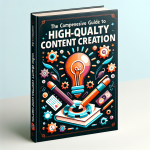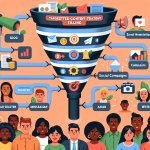Content Creation Process for Content Creators, Agencies, and SMB Owners
Introduction
In the ever-evolving digital landscape, creating high-quality content efficiently is essential for content creators, agencies, and SMB owners. This article delves into the comprehensive process of crafting standout content using advanced tools and workflows, which is pivotal in converting potential customers at the consideration stage of the buyer’s journey.
Recent advances in AI-driven tools and automation have revolutionized content creation, making it more efficient and effective. We’ll explore various aspects of this transformation, detailing different stages and strategies to streamline your workflow and maximize your content’s impact.
The structure of this piece will guide you through key topics, including content production pipelines, AI-driven SEO, machine learning personas, automated QA, social media management, and more.
Goals
Foster Customer Engagement
Utilizing tailored content production pipelines helps streamline the entire content creation process, saving time and increasing productivity. This, in turn, allows creators to focus on engaging with their audience more effectively.
User engagement can be further amplified through interactive elements such as webinars, Q&A sessions, and live demos, helping to foster a deeper connection with potential customers.
Establish Authority and Trust
Leveraging AI-driven SEO tools enhances content visibility and reliability, building trust with potential customers. Establishing a credible online presence is critical at the consideration stage, as it reassures prospects about the value and authenticity of your offerings.
Testimonials, case studies, and expert opinions serve as powerful tools to validate your authority and build trust.
Improve Customer Education
Educating your audience about products or services is crucial. Detailed guides, walkthroughs, and comprehensive FAQs help clarify benefits and usage, ensuring potential customers make informed decisions.
Advanced content strategies like leveraging machine learning author personas can personalize content to align with specific audience segments, significantly improving customer education.
Content Approaches
Here are various approaches to creating effective consideration content:
- Provide detailed, informative content addressing customer needs.
- Incorporate testimonials, case studies, and expert opinions to build trust.
- Use comparisons and product demonstrations to highlight key points.
- Offer detailed walkthroughs or instructional guides.
- Compile comprehensive FAQs to address common concerns.
Engagement Techniques
Engaging your audience effectively in the consideration stage can significantly impact conversions:
- Use interactive elements like webinars, Q&A sessions, and live demos.
- Pay attention to audience questions and feedback.
- Encourage active participation and deeper exploration of topics.
- Personalize interactions to better meet individual customer needs.
Measuring Impact
Measuring the impact of your consideration content helps refine your strategy:
- Track key metrics such as engagement and conversion rates.
- Analyze data to assess content effectiveness.
- Gather audience feedback using various tools and methods.
- Use feedback to refine and improve content strategies.
- Adjust strategies based on data analysis to optimize performance.
Conclusion
The consideration stage of the buyer’s journey is crucial for converting potential customers. By employing advanced tools and workflows, content creators, agencies, and SMB owners can significantly enhance their content creation process, providing substantial time and cost savings while ensuring high-quality output and enhanced visibility.
We hope this comprehensive guide offers valuable insights and strategies to streamline your content creation workflow. We encourage you to apply these insights and share your thoughts or experiences related to this topic.
Stay informed about related topics and developments by following our updates.
Related Posts:
Transforming Your Content Strategy with Advanced Tools and Workflows (98.02% match)
`Comprehensive Guide to High-Quality Content Creation` (97.11% match)
Leveraging Advanced Tools and Workflows for Effective Content Creation (96.73% match)












